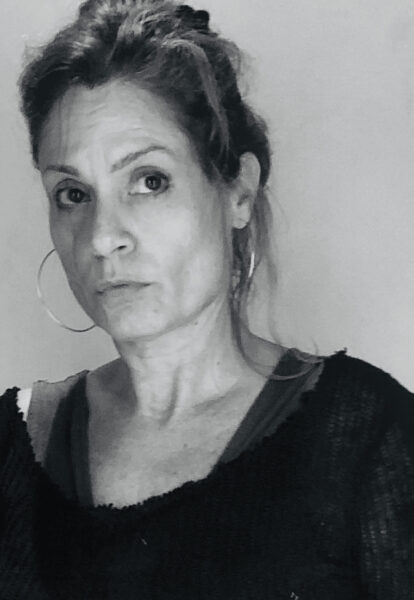OK, so when I read this I remembered a cooking show (maybe The Great British Bake Off?) that did a segment on a shop in London that made traditional eel pies. Talk to me about what made you decide to write a piece of flash fiction with an eel narrator.
This piece came from a joyous place: raiding my own tweets. One of the things I love about Twitter is the wicked sense of humor shared among my writing crew there – which has a tendency to up my own humor game. The flash arose from an actual UK news story – yes, the headline was really “Another Problem Eels Don’t Need,” with wildlife experts worried about cocaine falling into the Thames. At the time, I tweeted that ‘another problem eels don’t need’ sounded like something that would become slang metaphor for the whole insanity of 2022.
There have been a few times – especially during the workshops of A SmokeLong Summer, when we were writing fast and furious every day – that I found myself hearing the seeds of flash pieces in what I was posting on Twitter (don’t even get me started about the whole sex toy story). My initial goal had little to do with the eels, but more with all that was going wrong in the world. In its earliest draft, each paragraph focused on that.
But that eel’s voice just took over. Number one thing I’ve been learning: when an eel takes over, you give it the wheel. A bit of eel sex research (yes, that’s a thing) and it all started coming together. Cough.
Related to the previous question: Have you ever eaten an eel pie? If so, would you recommend it?
The closest I come to eating eel pie is that I made an “eeeeeee” sound at the thought of it. I speak multiple languages and frequently write across international borders, but my travel weakness is that I am not the bravest eater. Which of course makes me an excellent advocate for NOT eating eels.
I’d add: prior to this piece, my closest connection to eels is that I am a ravenous fan of crime noir and I’d heard a murderous rumor that eels used to be kept in the bottom of freshwater wells because they would eat dead things that fell in, helping to keep the water sanitary (is that a lie? did I believe a lie?)… which puts eels in a nightmare category for me.
I also live in the tropics, and I know of eels as one reason you never put your hand into any kind of hole underwater. You’re welcome for that pro tip.
I’ve heard editors … and some writers… quip that flash fiction is nothing but a first draft. Why are they wrong? What makes flash fiction different? What’s your editing process like?
Most of the time, I write longer. For those of us writing novels, there is a relief in the brevity of flash – of being able to write many things instead of just one long one; of being able to be done quickly.
That doesn’t mean flash happens in a first draft. Flash is meticulous art. There is a level of precision of language, image, sound, and effect in flash that doesn’t come from throwing spaghetti at a wall. Honing takes place at the word level, at sentence beat and rhythm, in contraction to intensify, and expansion to increase effect. Lots of my drafts are waiting to be combined with other pieces or reworked or tried in a new structure or…
On the other hand, I also feel like flash is quickly killed by overworking. There is a raw quality to it that embraces the fierce, unexamined energy of first drafts. It reminds me of trying to shelter a flame when starting a fire – you need to add oxygen and fuel, but it’s a careful balance not to blow it out or smother it.
For this and another humorous piece I wrote recently (yes, the sex toys), I had a deadfast rule that I would not do more than two revisions because I was worried about flattening the original effect. I made notes before going in, and only went in to revise once I was ready. The main revisions on this piece were to put it fully in the eel’s voice, add the eel sex/Sargasso research, and flip the order of paragraphs to end on the last line.
I’d add, with huge amounts of love for SmokeLong, that revising in workshop was great for this – my workshop peers that fortnight were cheering this piece on, so it felt like it arose out of a party.
One of the things about this story that draws me in is the pacing. It reads to me like an eel is stump speeching to other eels. “You know another problem eels don’t need?” Maybe even a TED Talk. Was this something you had in mind before you wrote or was this something that came out as the narrator’s voice took shape?
In the original draft, the narrative was more of an exchange between human and eel. I come out of journalism and, in my head, it was more about the article that had not been written about real issues – more about the shitshow of 2022 than the animals. But the irony of the opposite extreme took over. Eel karaoke and disco balls and drugged out bliss were the ridiculous reflection of what I would have said about real-world issues and were 1000% more coked up than the human version.
One of the biggest things I’ve learned is there is what you were going to say and what started to come alive as you wrote. We talk about our voice and intention as a writer – but too often I’ve found it works better to save what you wanted to say for another piece and instead always go with the thing that came alive as you’re writing. The eel’s voice won the day.
Do eels really not need poets? This poet wonders as well.
Oh, come on. We all know that eel has a spoken word open mic night on Thursdays. Of course eels need poets. What else are they there for?



 The SmokeLong Grand Micro Contest (The Mikey) is now an annual competition celebrating and compensating the best micro fiction and nonfiction online.
The SmokeLong Grand Micro Contest (The Mikey) is now an annual competition celebrating and compensating the best micro fiction and nonfiction online.